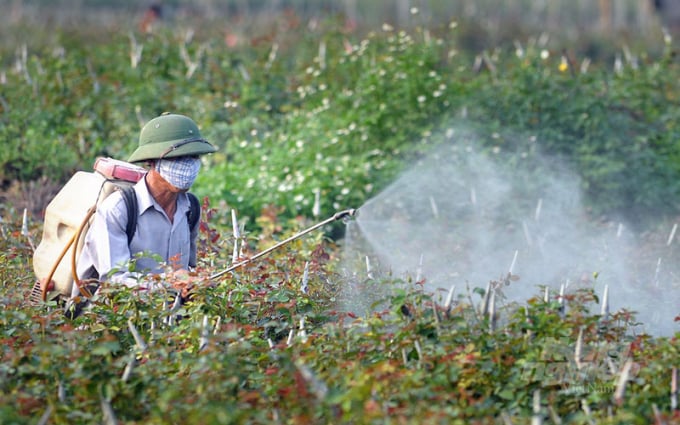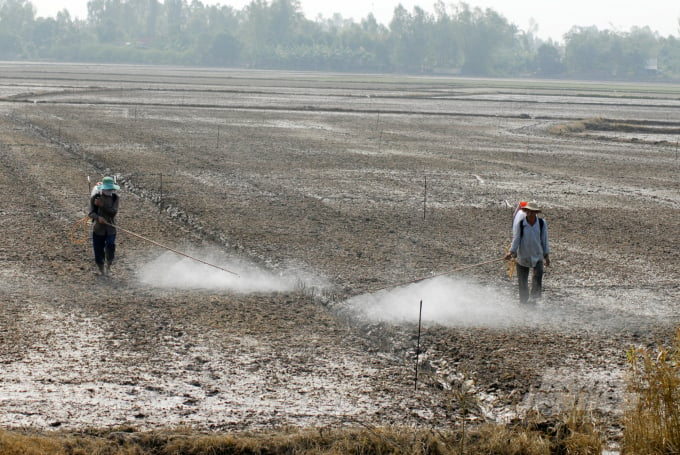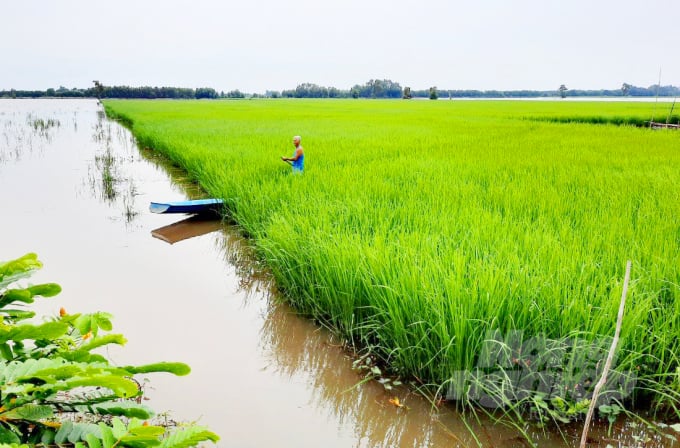November 22, 2025 | 20:50 GMT +7
November 22, 2025 | 20:50 GMT +7
Hotline: 0913.378.918
November 22, 2025 | 20:50 GMT +7
Hotline: 0913.378.918

Many places in the Mekong Delta are still abusing fertilizers and chemical pesticides. Photo: Pham Hieu.
Fertilizers and chemical pesticides abuse in the Mekong Delta has received a warning for many years but in reality, the change has been very slow. Meanwhile, it’s common knowledge that this act of abuse makes the risk of land and water contamination, food insecurity, and degradation of natural ecosystems increasingly present.
A recent report of the Department of Plant Protection (MARD) shows that compared to other regions and areas in the country, the amount of fertilizer used in the Mekong Delta is 42% higher, 72% higher in the case of chemical pesticides. The provinces of Ben Tre, Tien Giang, and Dong Thap all use fertilizers and chemical pesticides many times higher than other localities in the country.
Local farmers are in fact the ones who experience the consequences of fertilizers and chemical pesticides the deepest. All shared the same opinion when asked: The fertility and nutrients in the soil have gravely decreased.
In order to ensure crop productivity, there is currently no other choice but to maintain and increase the dose used, all the more reason to incur additional costs while remaining unable to “revitalize” the soil.
As for the natural ecosystem, the rural people of the Mekong Delta realize that the richness of the past has increasingly disappeared. Whether it is in the garden or outside the field, it is difficult to find fish and shrimp for daily meals.
Many wild plants in nature that used to grow in abundance (holly, water banana, stenochlaena palustris, etc.) have become scarce and difficult to find due to the overspraying of chemicals.

The former richness of the ecosystem is slowly disappearing. Photo: Le Hoang Vu.
In order for farmers to stop using chemical fertilizers and pesticides following their “experience” and “will”, Mekong Delta localities have constructed and initiated clean agricultural models and renewed agricultural extension activities.
However, most farmers find it difficult to keep up because of a lack of capital and production capacity. Clean agricultural products are easily equated with similar products when brought out to the market due to insufficiency of guarantee.
In early December, the Department of Plant Protection, Dong Thap Department of Agriculture and Rural Development and CropLife Vietnam signed a contract to launch “Cooperation program on safe and effective use of pesticides”.
The guidance program on safe and effective use of pesticides will be implemented from 2021 to 2025 in Dong Thap. The goal is to help local farmers access and receive training in principles of safe, effective and responsible use of pesticides.

The goal is to help local farmers access and receive training in principles of safe, effective and responsible use of pesticides. Photo: Le Hoang Vu.
The program sets goals by 2025:
Mr. Hoang Trung, Director of the Department of Plant Protection said that the Department will assume the prime responsibility and coordinate with the parties to develop a set of documents and videos on instructions for safe and effective use of pesticides as well as documents on collection and treatment of drug packages after use.

The Mekong Delta will be able to move towards sustainable agriculture after solving the issue of fertilizers and chemical pesticides abuse. Photo: Le Hoang Vu.
In addition, the Department of Plant Protection will organize training for technical staff of the provincial Department of Agriculture and Rural Development on regulations related to pesticide management and urge the parties to follow the plan.
"We believe that the program will contribute to heightening the responsibility of farmers, improving the value of Dong Thap agro-products, raising the status of Vietnamese agro-products in general," said Mr. Hoang Trung.
The localities in the Mekong Delta are entering the stage of strongly implementing the Government's Resolution No. 120/NQ-CP on sustainable development of the Mekong Delta to adapt to climate change, including the target of improving agro-products value and competitiveness.
This is a new opportunity for the Mekong Delta to move towards sustainable agriculture. The Mekong Delta will be able to move towards sustainable agriculture after solving the issue of fertilizers and chemical pesticides abuse.
Translated by Samuel Pham

(VAN) Results from the Sustainable Durian Model Project in Dak Lak have confirmed the critical role of Yara Viet Nam in transferring advanced nutritional solutions to farmers.

(VAN) In Tuyen Quang province, livestock farmers have introduced effective models and innovative practices that significantly strengthen African Swine Fever prevention and control efforts.

(VAN) This is the study conducted by IRRI and Can Tho University on the rice straw value chain in Mekong Delta showing an economic potential of more than 6.6 trillion VND/year.

(VAN) By participating in cooperative economics, many farmers in Tay Ninh have overcome hardship, mastered clean dragon fruit cultivation techniques.

(VAN) The crossbreeding program in the former Binh Dinh province (now part of Gia Lai) has shown signs of decline, and urgent measures are needed to revive it and sustain past achievements.

(VAN) The agricultural sector agreed on a roadmap to pilot the MRV protocol and expand low-emission rice production from the 2025-2026 winter-spring crop.

(VAN) Agricultural extension officers in Quang Ninh do more than transmit knowledge; they have become a steadfast support system for farmers on the path to sustainable agricultural development.